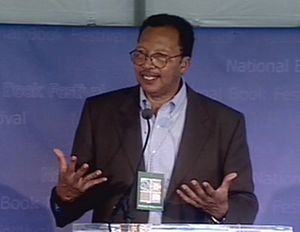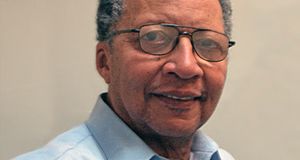Walter Dean Myers facts for kids
Quick facts for kids
Walter Dean Myers
|
|
|---|---|

Myers in 2001
|
|
| Born | Walter Milton Myers August 12, 1937 Martinsburg, West Virginia, U.S. |
| Died | July 1, 2014 (aged 76) New York City, U.S. |
| Occupation | Writer |
| Period | 1969–2014 |
| Genre | Young adult novels, nonfiction, poetry |
| Notable works |
|
| Notable awards | Margaret Edwards Award 1994 Michael L. Printz Award 2000 |
Walter Dean Myers (born Walter Milton Myers; August 12, 1937 – July 1, 2014) was a famous American writer. He wrote many books for children and young adults. He was born in Martinsburg, West Virginia, but grew up in Harlem, New York City. Walter had a tough childhood, and his teachers encouraged him to write as a way to share his feelings. He wrote over 100 books, including picture books and non-fiction. He won the Coretta Scott King Award five times for his amazing stories about African-American characters. His book Fallen Angels is about the Vietnam War and is known for its realistic language.
Walter Dean Myers was also the third U.S. National Ambassador for Young People's Literature. He held this special job in 2012 and 2013. He also helped guide the Society of Children's Book Writers and Illustrators (SCBWI).
Contents
About Walter Dean Myers
Walter Milton Myers was born in Martinsburg, West Virginia, on August 12, 1937. When he was three years old, he went to live with Florence and Herbert Dean. They raised him in Harlem, New York City. Herbert Dean was African-American, and Florence was German and Native American. She taught English at a high school. Later, Walter took "Dean" as his middle name to honor his foster parents.
Childhood and Early Life
As a child, Walter's life revolved around his neighborhood and church. His neighborhood felt like a safe place, and the church gave him guidance. He was very smart but sometimes struggled in school. He was known for being a bit disruptive. Walter had trouble speaking and was often teased for it. This made him upset, and he sometimes got into fights.
A teacher saw him struggling and told him to try writing. She thought it would help him express himself better. This is how he started writing poetry and short stories. He also developed a strong love for reading early on.
High School and Writing Dreams
Walter wrote well in high school. His teacher, Bonnie Liebow, noticed his talent. She also worried he might drop out of school. So, she advised him to keep writing no matter what happened. He didn't fully understand her words at the time. Years later, while working a construction job, he remembered her advice.
Walter began to write at night. He often wrote about his difficult teenage years. When asked what was most important to him, he said, "My books. They were my only real friends growing up." Walter went to Public School 125 and Stuyvesant High School. He left school at age 17 to join the U.S. Army.
Finding His Path as a Writer
After leaving the army, Walter found it hard to find work and his purpose. This struggle made him think about his high school teacher's advice again. He started writing articles for men's magazines. He wasn't truly inspired until he read Sonny's Blues by James Baldwin. This book was set in Harlem and featured African-American characters. It made Walter want to write stories based on his own life experiences.
Walter Dean Myers lived in Jersey City, New Jersey, with his family. He had a wife, two sons named Christopher and Michael, six grandchildren, and two great-grandchildren. His son, Christopher Myers, is also a writer and illustrator. Walter's daughter, Karen, passed away before him.
A Champion for Young Readers
Walter Dean Myers was a very productive author. He wrote over 100 books for children and young adults during his 45-year career. His writing often focused on the tough experiences of teenagers. He wanted to show young people that reading is very important.
From 2012 to 2013, Walter was the National Ambassador for Young People's Literature. The Library of Congress chose him for this two-year role. The job was created to help everyone understand how important reading and education are for life. As Ambassador, Walter traveled across the United States. He encouraged young people to read with his slogan, "Reading is Not Optional."
Walter Dean Myers passed away on July 1, 2014, in Midtown Manhattan, after a short illness. His last written work was an article for The New York Times. In it, he asked for more books that show different kinds of people, especially African Americans. A special grant and award were later named after him by the We Need Diverse Books organization.
Awards and Recognition
Walter Dean Myers received many important awards for his writing. In 1994, the American Library Association gave him the Margaret Edwards Award. This award honors writers who have made a big and lasting impact on young adult literature.
In 2010, he was nominated for the international Hans Christian Andersen Award. This award recognizes a writer's entire contribution to children's literature.
Margaret A. Edwards Award
The Margaret A. Edwards Award celebrates a writer and their specific works that have greatly helped young adult literature. Walter Dean Myers won this award in 1994. The award recognized four of his books published between 1983 and 1988: Hoops (1983), Motown and Didi (1985), Fallen Angels (1988), and Scorpions (1988).
Librarians who work with young adults noted that these books showed African-American youth in a real way. They also said that the books appealed to all young people, no matter their background. They felt Walter Dean Myers' writing showed that teenage experiences in cities are similar for everyone.
Newbery and Printz Awards
Walter was a runner-up for the annual Newbery Medal twice. This medal is given for the "most distinguished contribution to American literature for children." He was a runner-up in 1989 for The Scorpion and in 1993 for Somewhere in the Darkness.
Later, the American Library Association created a new award just for young adult literature, called the Michael L. Printz Award. Walter Dean Myers was the very first winner of this award in 2000 for his book Monster (published in 1999). This meant Monster was chosen as the year's "best book written for teens, based entirely on its literary merit."
Other Honors
Walter Dean Myers' first published book was a contest winner. It was called Where Does the Day Go?, written by Myers and illustrated by Leo Carty (1969). It won a Council on Interracial Books for Children Award in 1968.
He was also a finalist for the National Book Award for Young People's Literature three times. These nominations were for Monster in 1999, Autobiography of My Dead Brother in 2005, and Lockdown in 2010. Walter Dean Myers is even mentioned in Sharon Creech's 2001 book Love That Dog. In that story, a young boy looks up to Myers and wants him to visit his class.
 | Kyle Baker |
 | Joseph Yoakum |
 | Laura Wheeler Waring |
 | Henry Ossawa Tanner |


